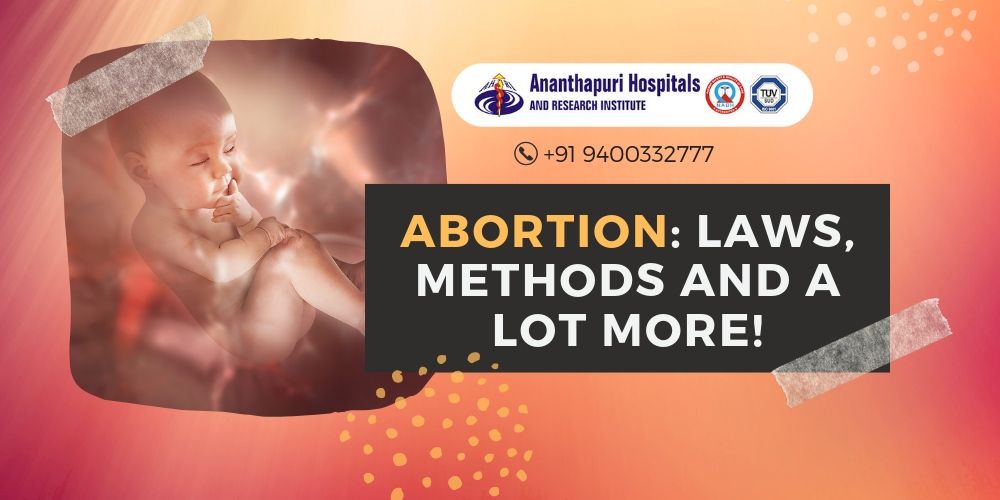- 01/May/2019

Abortion rights, procedure, risks and lot more - Ananthapuri Hospitals
Following the wave of anti-abortion laws that swept across the U.S, the internet is debating over “Pro-Life or Pro-Choice”. These terms generally narrow down to whether an individual thinks abortion should be banned or accepted.
So, do Indian laws favour Pro-Life or Pro-Choice? How much do you know about abortion laws in India? What are the methods? Are there any risks that come with it? Will anyone else know if you get an abortion? Ananthapuri Hospitals, being a healthcare establishment, has decided to shed some light on abortions.
KEEP READING TO KNOW MORE!
Unsafe abortion is the third leading cause of maternal mortality in India! When it comes to abortion, there are a lot of stigmas associated with it in our society. These stigmas often silence women and indirectly force them to break laws and opt for unsafe abortion.
Speaking of laws, we truly believe there should never come a situation where a woman is denied the right to decide what to do with her pregnancy.
Parenthood is completely different from the phase of life before it. During this phase, you need to be responsible for your own life and also someone else’s - your child’s! It is definitely not so easy.
Good things that happen at a bad time will not always have a good impact on your life. This particularly applies to pregnancy. A pregnancy that you did not intend can possibly disrupt your ability to make a living or raise a family.
If abortion is your only way out of an unplanned pregnancy, or it poses a risk to your mental or physical health, then here are some things you need to know:
- ABORTION LAWS IN INDIA
- It is safe to say that India favours pro-choice but like any other laws, it comes with conditions. In India, you are legally allowed to have an abortion if:
- The continuation of the pregnancy poses any risks to the physical or mental health to you
- The fetus has any severe abnormalities
- The pregnancy occurred as a result of a failure of contraception
- The pregnancy is a result of sexual assault or rape
- Abortion is legal only until the 20th week of pregnancy. After 20-weeks of pregnancy, it can be done legally only in exceptional circumstances such as in cases where there is a substantial risk of physical or mental disability after the child is born. But for this, you need permission from the court of law and it can be a long procedure.
- If you are an adult with sound mental health, you do not need anyone's consent to have an abortion. Legally, it is okay not to tell even your husband about it. However, your husband has the rights to file for divorce if you got an abortion without his consent.
- You need to consult a Registered Medical Practitioner (RMP) to have a safe and legal abortion, and it is done only in a government-approved facility. Most gynaecologists are authorised to perform abortions but other specialists also can get the necessary accreditation.
- To do an abortion within the first 12 weeks, you need the approval of only one RMP. After 12 weeks, you will need the approval of two RMPs.
- ABORTION METHODS AT DIFFERENT STAGES OF PREGNANCY
Abortion methods depend on the stage of your pregnancy. To accurately know your stage of pregnancy, you should do an ultrasound scan.
Given below are different stages of pregnancy and the corresponding abortion methods done:
- Within the first 7 weeks: You only need to take medications prescribed by the RMP. You may also need to do a follow-up with the RMP to ensure that the abortion was successful.
- Between 7-9 weeks: Your RMP will still try to medically manage it. However, the chances of failure during this period is high. If medical management does not work, a surgical termination will be required.
- Beyond 9 weeks and up to 11 or 12 weeks: Abortion needs to be done surgically. It is a one-day procedure. You will be able to recover to good health within one or two days.
- Beyond 12 weeks and up to 20 weeks: Abortions are a little more difficult during this period. You will require an induction like normal delivery, followed by surgical evacuation.
The pain or discomfort you experience in any abortion method is comparable to what you experience during periods. The earlier you have an abortion, the less painful it will be. You will always be given pain relief medication and proper medical advice.
- ABORTION RISKS
Abortion, like any other medical procedure, carries some risks. The risks include heavy bleeding, uterine perforation, and infections which may or may not affect future pregnancies. Having an abortion at a later stage increases the degree of risks.
- ABORTION CONFIDENTIALITY
Having an abortion is an issue of concern between you and the health professionals only. Sharing information with unauthorised persons, without your consent, is illegal. The woman herself is supposed to take the final decision to terminate a pregnancy. The doctor will provide proper advice and counselling to make sure you experience no pressure.
------------------------------------------
Not taking proper contraceptive care as a reason for abortion should not be encouraged. It is always advised that you take proper contraceptive measures when you plan on having sexual intercourse with your life partner to prevent any unwanted pregnancies. Play safe to be safe!
The Obstetrics and Gynaecology Department offers dedicated care with comprehensive diagnostic services and treatment facilities for women with high-risk pregnancies. Comprehensive, critical and multidisciplinary prenatal care for women and newborn is provided round the clock. To book an appointment, call us at +91 9400332777 or visit our hospital at Chacka, NH Bypass, Thiruvananthapuram.

